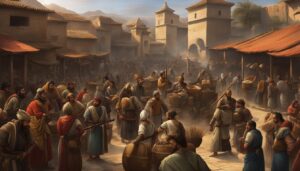
In biblical times, political leadership held immense significance and played a vital role in shaping society. Understanding the dynamics of political leaders during this era provides valuable insights into the complexities of biblical society. This study delves into the influential figures and their roles in governing and upholding religious values.
Key Takeaways:
- Political leadership in biblical times exerted a significant influence on society.
- The Sadducees, Pharisees, and Essenes were prominent Jewish sects during Jesus’ time.
- Biblical leaders, like King David and King Solomon, served as both political and spiritual guides for the Israelites.
- The Bible offers valuable lessons on leadership, emphasizing qualities such as courage, wisdom, humility, and faith.
- Servant leadership, as exemplified by Jesus Christ, prioritizes the needs and well-being of others.
Influence of Political Leaders in the Bible
Political leaders in the Bible played a crucial role in shaping the society of their time. They not only held political power but also carried the responsibility of upholding religious values and ensuring the well-being of their people. One notable example is King David, who was not only a skilled military leader but also a man after God’s own heart. David’s leadership brought prosperity and unity to the nation of Israel as he followed God’s commands and sought righteousness.
Another influential figure in biblical history is King Solomon, known for his wisdom and wealth. Solomon’s reign was marked by peace and prosperity, and he was renowned for his ability to govern with justice and fairness. As a political leader, Solomon demonstrated the importance of using power and resources for the betterment of the people.
It is important to note that the influence of political leaders in biblical times extended beyond governance. They were expected to lead by example and inspire their people to live according to God’s laws. Their actions and decisions impacted the lives of the entire nation, and they were responsible for maintaining law and order, enforcing justice, and protecting their people from external threats.
The political leaders in the Bible were not only rulers, but also spiritual figures who played a vital role in guiding the people towards righteousness and obedience to God.
Understanding the influence of political leaders in the Bible provides valuable insights into the complexities of political responsibilities in biblical times. It serves as a reminder that leadership is not solely about holding power, but also about embodying moral values, fostering unity, and ensuring the well-being of those under their authority. As we study the examples of biblical leaders, we can gain wisdom and inspiration for our own leadership journeys, applying the lessons learned to promote justice, righteousness, and the common good.

Table: Political Leaders in the Bible
| Name | Role | Key Accomplishments |
|---|---|---|
| David | King of Israel | Unification of Israel, establishment of Jerusalem as the capital, military victories |
| Solomon | King of Israel | Construction of the First Temple in Jerusalem, expansion of trade and wealth |
| Moses | Prophet and Leader | Leading the Israelites out of slavery in Egypt, receiving the Ten Commandments |
| Deborah | Judge | Leading the Israelites in battle against their enemies, providing wise counsel |
Leadership Lessons from the Bible
The Bible offers valuable insights and lessons on leadership that are relevant to modern times. By studying biblical perspectives on leadership, we can gain a deeper understanding of the qualities and principles that make a great leader.
Leadership Qualities
Throughout the Bible, we find examples of leaders who demonstrated qualities such as courage, wisdom, humility, and faith in God. These leaders led by example and prioritized the needs and well-being of their people. One notable example is Moses, who displayed extraordinary courage and leadership when leading the Israelites out of Egypt.
“Be strong and courageous. Do not be afraid; do not be discouraged, for the LORD your God will be with you wherever you go.” – Joshua 1:9
Another example is Joshua, who succeeded Moses and led the Israelites into the Promised Land. Joshua showed great faith in God’s promises and diligently followed His instructions. King David, known for his wisdom and courage, is also an excellent example of a biblical leader.
Servant Leadership
The Bible also emphasizes the importance of servant leadership. Jesus Christ, in particular, is considered the ultimate example of a servant leader. He taught his disciples to serve others and emphasized the importance of humility and selflessness.
“For even the Son of Man did not come to be served, but to serve, and to give his life as a ransom for many.” – Mark 10:45
Leaders who follow the principles of servant leadership focus on the well-being of their followers and strive to support and empower them. They prioritize collaboration, empathy, and the collective goals of the group rather than seeking personal gain or power.
By studying the leadership examples presented in the Bible, individuals can gain inspiration and insights that can be applied to their own leadership roles. The timeless wisdom found in the biblical narratives continues to shape and influence leadership practices today.

Conclusion
Studying the political leadership in the time of the Bible provides valuable insights into the complex dynamics and influences of biblical society. The leaders of that era carried significant responsibilities, not only in governing the nation but also in upholding religious values and traditions. Their power to shape society and impact the lives of the people cannot be overlooked.
The Bible offers a wealth of knowledge on leadership, presenting us with various examples of both positive and negative qualities exhibited by political leaders. By delving into these biblical perspectives, we can derive timeless leadership lessons that can be applied in our modern context.
Leadership in biblical times revolved around more than just political responsibilities. It encompassed a deep sense of religious duty and moral guidance. The biblical leaders demonstrated admirable qualities such as courage, wisdom, humility, and faith in God. They led by example, placing the needs and well-being of their people above their own.
Additionally, the concept of servant leadership presented in the Bible remains pertinent today. Leaders are encouraged to serve and support their followers, rather than seeking personal gain or power. Jesus Christ himself serves as the ultimate example of servant leadership, with his act of washing the feet of his disciples and making the ultimate sacrifice for humanity’s salvation.
FAQ
What were the influential Jewish sects during Jesus’ time?
The influential Jewish sects during Jesus’ time were the Sadducees, the Pharisees, and the Essenes.
Who were the Sadducees and what did they believe?
The Sadducees were wealthy and closely associated with the high priestly families. They rejected laws that were not explicitly written in the Torah and did not believe in resurrection or spirits.
What were the beliefs of the Pharisees?
The Pharisees were the largest group and had considerable influence in Israelite society. They believed in the resurrection of the dead and punished lawbreakers.
Who were the Essenes and what were their beliefs?
The Essenes were a strict community, and some scholars believe they were connected to the Qumran community. They believed in a strict hierarchy and had a strong commitment to purity.
What role did political leaders play in biblical times?
Political leaders in biblical times were responsible for maintaining law and order, enforcing justice, and leading the people. They were also expected to follow God’s commands and promote righteousness among the people.
Who were some notable biblical leaders and what qualities did they possess?
Notable biblical leaders like Moses, Joshua, and David demonstrated qualities like courage, wisdom, humility, and faith in God. They led by example and put the needs and well-being of their people above their own.
What is servant leadership and why is it important?
Servant leadership is when leaders serve and support their followers rather than seeking personal gain or power. It is important because it promotes a selfless and compassionate approach to leadership.
How can studying biblical perspectives on leadership benefit modern leaders?
Studying biblical perspectives on leadership provides valuable insights and principles that can be applied in modern leadership. It can help leaders gain a deeper understanding of their roles and responsibilities and inspire them to lead with integrity and humility.








